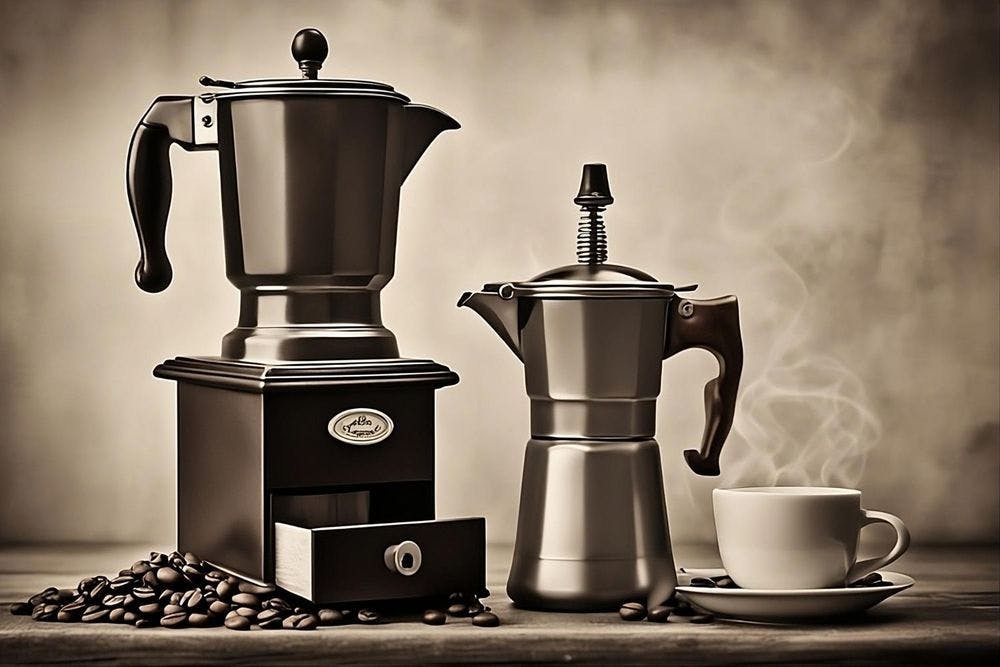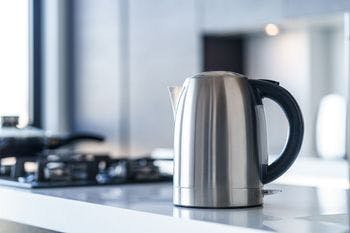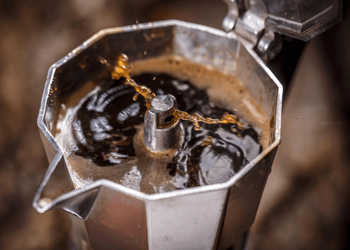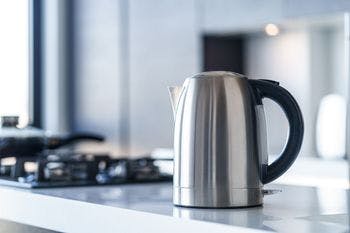
Electric vs. Stovetop Percolator: Which is Better?

Traditional stovetop percolators are remarked for its old school charm while electric stove top wins the coffee world with their convenience.
The selection of the right percolator for a perfect coffee is vital. If you are a coffee lover who loves to brew using a percolator but is confused between an electric percolator and a stovetop one? Then stay with us till the end.
In this guide, I will be comparing electric and stovetop percolators. Also, I will explore the pros and cons of each and will help you decide the perfect fit for your daily coffee ritual.
Electric percolator overview
What is an electric percolator?
Electric percolators are coffee-making machines specifically designed to ease and automate the percolation process. It simplifies the coffee-making process by using electricity, making your morning routine a breeze.
In electric percolators, the water is heated and sent up in a tube, from where the water then drips over coffee grounds, extracting the intense flavors and circulating continuously through the grounds until you get a rich and robust brew.
Benefits of using an electric version
1) Brewing simplified
With electric percolators, you can brew flavorful coffee with no extra effort. Simply plug in the percolator, add water and coffee grounds, and let the electric device do the magic. No manual heating or monitoring; everything is automated.
2) Consistent coffee
As electric percolators are totally automated, they yield precise results. It works by maintaining a consistent temperature and brewing time, which yields a consistently flavorful cup.
3) Saves time
Electric percolators brew coffee comparatively faster, so you can savor flavorful coffee hassle-free even on days when you are running late.
4) More convenient
Most electric percolators come with features like timers and automatic shutoff, which makes them more reliable and quick.
5) Variety of options
Electric percolators are available in different options. You can adjust the settings and other brewing parameters to achieve the coffee you prefer.
Get the right electric percolator for authentic percolating coffee from HERE.
Disadvantages
1) Comparatively complex
Electric percolators have a more complicated design, which makes it challenging to clean and maintain them.
2) Depends on electricity
As the name says, electric percolators are dependent on electricity. It means they won't work without power in remote locations which becomes a constraint.
3) Less portable
Electric percolators are bulkier which makes them difficult to carry and as a result, they are less portable than their stovetop counterparts. They are not feasible for camping or travel because of their larger size.
4) Can't brew large coffee
Though electric percolators are available in different sizes generally they are smaller than stovetop percolators. So if you need to brew large batches of coffee, they won't be able to satisfy you.
5) More expensive
As compared to stovetop percolators, electric ones are more expensive because of their advanced features.
Stovetop percolator overview
What is a stovetop percolator?
A stovetop coffee percolator is a type of coffee machine that is entirely manual and relies on a heat source, commonly a stovetop burner, to brew coffee. It works by heating water in a bottom chamber.
The hot water then rises through a tube to the top chamber, from where it rains down over coffee grounds. This process is continuously repeated until the desired coffee strength is achieved.
It is specifically designed to be used on a stovetop or open flame. Most stovetop percolators are made of materials, such as stainless steel or aluminum.
They are marked best for their flavorful and robust coffee. Stovetop percolators come in different sizes to accommodate different coffee lovers' needs and are ideal for camping and outdoor enthusiasts.
Benefits of using stove top version
1) User-friendly
Stovetop percolators are easy to use, which makes them ideal for those who prefer a no-fuss simplified coffee-making process. Just add some water, add coffee grounds, and heat.
2) More durable
Stovetop percolators are generally made of strong materials like stainless steel, which makes sure that they can withstand rough use and last longer.
3) Portable
Stovetop percolators are comparatively compact and durable which makes them perfect for camping, hiking, and other outdoor activities where you may not have electricity access.
4) Strength can be customized
With the adjustable brewing time and the amount of coffee grounds stovetop percolators allow you to control the coffee's strength, which provides you the flexibility to brew as per your taste preferences.
5) Visually appealing
Stovetop percolators have a nostalgic charm that is adored by most coffee lovers.
6) Cost-effective
As compared to electric ones, stovetop percolators are more affordable which makes them an economical choice for coffee lovers with budget constraints.
7) Versatile
Stovetop percolators can also be used to make other hot beverages, such as tea or hot chocolate which makes them a versatile option.
8) Reliable
As stovetop percolators work on manual processes it is less prone to technical malfunctions or breakdowns since they hardly have electronic components, which makes them reliable.
Get the right stovetop percolator from HERE.
Disadvantages
1) Manual operation
Stovetop percolators need manual monitoring of the brewing process, including adjusting heat levels and timing. It can be challenging in situations when you are running late and require automation for convenience.
2) Risk of over-extraction
As everything is controlled manually there is no precise temperature control, which brings a risk of over-extracting the coffee grounds, resulting in a bitter-tasting coffee. Attaining the perfect brewing time and temperature here can be a learning curve.
3) Dependent on heat source
Stovetop percolators are dependent on an external heat source, like a stovetop or campfire. It can just be used at locations with access to these heat sources.
4) Longer brewing time
Stovetop percolators often take longer to brew coffee compared to electric percolators, due to their manual adjustments and gradual heating.
5) Limited capacity
Most stovetop percolators have a smaller brewing capacity as compared to electric models which makes them less feasible for larger gatherings or households where you need to brew large batches.
6) Requires supervision
While brewing with a stovetop percolator, you have to take utmost care to prevent over-brewing or boil-overs, which makes them less convenient if you are multitasking.
7) Lacks precision
Stovetop percolators lack precision when it comes to temperature control and consistency which results in variations in coffee flavor and quality.
8) Traditional design
Most coffee lovers adore the classic design of stovetop percolators, while others may consider it outdated or less aesthetically pleasing.
Stovetop vs Electric: Quick comparison of each percolator
1) Design
Stovetop has a classic, traditional design while electric percolators are modern and often more sleek, which makes them perfect for modern kitchens.
2) Energy source
Stovetop percolators are dependent on a stovetop or open flame as an external heat source while electric ones are self-sufficient, and can simply be used by plugging into an electrical outlet, eliminating the need for a separate heat source.
3) Ease of use
Stovetop percolators require manual intervention to control brewing time and heat, whereas electric one's process with built-in timers and temperature control for added convenience.
4) Ease of cleaning
Stovetop percolators are easier to clean with fewer or no electronic components, while electric ones require more attention due to the electrical base and components.
5) Flavor profile
Stovetop percolators with manual control offer the advantage of controlling the flavor, whereas the consistent temperature and timing of electric ones result in a more uniform flavor profile.
6) Cost
Stovetop percolators are comparatively affordable, while electric ones tend to be more costly due to their added features and automation.
7) Portability
Stovetop percolators are excellent for outdoor use, thanks to their compatibility with portable heat sources. In contrast, electric ones have limitations as they require electricity to function.
8) Maintenance
Stovetop percolators are easy to maintain, with fewer components to worry about. Electric ones, on the other hand, have a more complex design, making them challenging to maintain.
Stovetop or electric: Which percolator is better for you?
The choice between a stovetop or an electric percolator ultimately depends on your needs and lifestyle. If you want convenience, consistency, and speed, an electric percolator may be your ideal choice. On the other hand, if you cherish control, versatility, and portability, a stovetop percolator could be the perfect match for you.
Wrapping up
In the electric vs. stovetop percolator showdown, both coffee makers have their distinct strengths and limitations.
Generally, I opt for the stovetop percolator when I crave a precisely controlled brew, savoring every flavor note in my coffee to start the day right.
However, on those hectic mornings when time is the barrier, the electric percolator comes to the rescue, ensuring a hassle-free brewing experience.
Your coffee preferences, lifestyle, desired brewing strength, and level of control over the brewing process can all be pivotal factors in determining the ideal device for you.

I am a coffee aficionado based in Seattle. I have devoted my passion and expertise to perfecting the art of home coffee brewing. I became known for my exquisite pour-over and espresso creations. I source coffee beans from local roasters and explores ...



